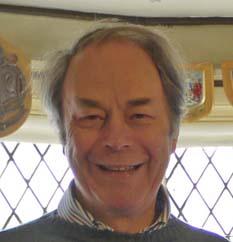Hamish Halls
Hamish Halls' decision to switch from Chemistry to Philosophy after his first year proved to be a very wise one. He explains why and vividly recounts life as an Edinburgh student in the 1960s.
| Name | Hamish Hall | |
| Degree Course |
|
|
| Year of Graduation |
1963 |

Your time at the University
I chose to study Chemistry at Edinburgh because of the University’s reputation, the fact I was born in North Queensferry, and because I enjoyed Scottish dancing. I also wanted to have some distance from my home in Devon.
However, I didn’t enjoy my first year out at King’s Buildings, and my Director of Studies recommended a change of faculty - so I decided to transfer to the Arts. I now spent my days in a noble and ancient building with fine libraries and within easy walking distance of the Union where I met students from many subject areas who helped to broaden my horizons. The said Union was more or less a gentlemen’s club with excellent facilities for reading, eating, debating and drinking. Haggis, neeps, tatties and gravy cost 1/6 (7½p) in the Haggis Bar.
Some lecturers stood out: Professor Talbot-Rice of Fine Art and Dr Brodie of Moral Philosophy. Dr Brodie's lectures were enlightening expositions of his theme (typically Kant and Hegel). He once announced that a previous lecture had, in his opinion, been unsatisfactory – so he did it again. I learnt a lot about the art of the pedagogue, which stood me in good stead when I later became a lecturer myself.
I got most of my academic encouragement from fellow students, many of whom were of high academic calibre. There were several budding politicians among the student body who achieved various degrees of fame — men of very different opinions but all getting on remarkably well with each other and all accomplished debaters.
The city was amazingly beautiful. No towers had yet been built and the only modern building I visited was the newly opened Holland House where I lived for two years. The city would still have been entirely familiar to Conan Doyle, or David Hume for that matter. George Square was still whole and intact, Princes Street was not yet dedicated to tourists, and many parts of the city were still lit by gas. The National Gallery was a revelation, and the Usher Hall concerts allowed me to see the finest performers for a very small cost.
Social life came in a wide variety to suit every taste and every pocket: rude sing-songs in the Union bar, the elegant Boat Club Ball, and ceilidhs put on by the Highland Society.
When I graduated I secretly felt it had all been too easy. However, I hugely enjoyed and valued my time at Edinburgh and I left with my mind and horizons broadened and my eyes and ears opened - plus the foundation of a real education.
I now spent my days in a noble and ancient building with fine libraries and within easy walking distance of the Union where I met students from many subject areas who helped to broaden my horizons.
Tell us about your experiences since leaving the University
Filled with a spirit of academic enquiry and an MA, I sought a postgraduate course. I was turned down by Moray House School of Education but was admitted to the Courtauld Institute of Art in London, then directed by Sir Anthony Blunt. Its home, in Portman Square, had the atmosphere of a very elegant, sophisticated club full of scholars and connoisseurs. Classes were very small, the staff acted as benevolent mentors, and mutual respect was high. The course was really an initiation into the specialised world of art history. But with this qualification I immediately gained a post as a lecturer at Canterbury College of Art (now merged into the University for the Creative Arts).
Times changed and in due course it became useful to re-train in computer science. Later I took a degree in Pure Maths with the Open University. Although officially studying maths, I also learnt a great deal about how to deliver and present courses.
Alumni wisdom
A friend who became a professor at Edinburgh recently said to me: "There’s more to being at university than being at university." A cryptic comment of course, but not every student thinks very hard about what education is or should be. I used to ask my students — particularly the more mature ones — what they were expecting from their time on the course. Having decided what you want out of university — and what you can bring to university life — make sure you are getting it, and let your tutors know if you are academically disappointed.
Do you have a story to share?
We are interested in the role that the University has played in your life, either directly - in terms of skills and knowledge - or indirectly, via friends, experiences or chance encounters. Please get in touch and you and your experiences could feature on our website.

